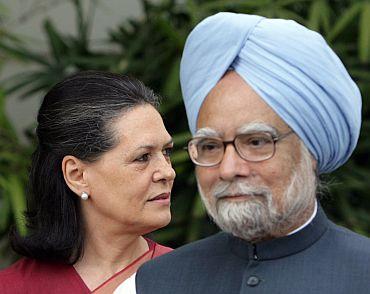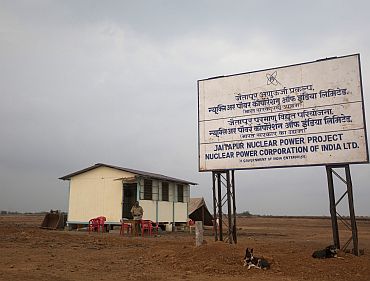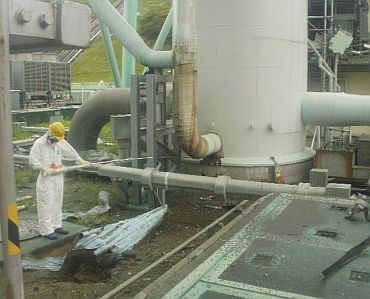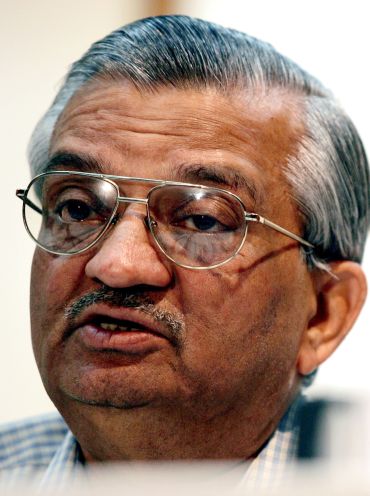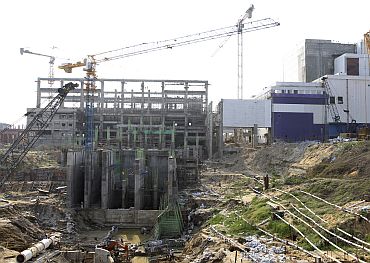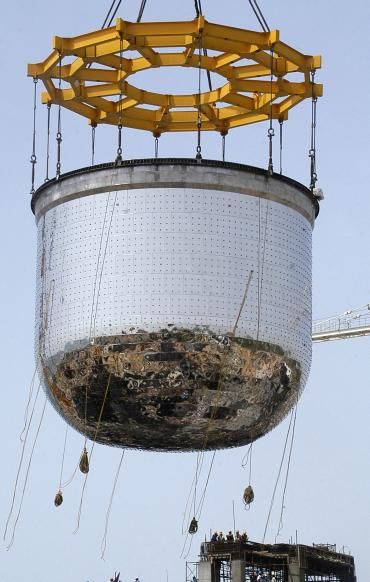 | « Back to article | Print this article |
Activists nationwide unite to battle UPA's nuclear dreams
Activists, experts and scientists across the country have come together to challenge Prime Minister Manmohan Singh's dream project to double the nuclear energy-based power generation in the country, reports Sheela Bhatt.
A writ petition filed by eminent lawyer Prashant Bhushan under Article 32 seeks appropriate writ for declaring Nuclear Liability Act, 2010, unconstitutional and to call for safety re-assessment and cost-benefit analysis of all nuclear facilities in India. The petitioners want the overhaul of the 'dysfunctional' regulatory system.
The petitioners comprise of distinguished personalities or organisations who have first time come together to challenge one of the biggest policy decisions of the United Progressive Alliance government.
The petitioners include Common Cause, a non-government organisation, Centre for Public Interest Litigation (one of the petitioners against the 2G scam), Dr E A S Sarma, former power secretary, T S R Subramanian, former cabinet secretary, Professor T Shivaji Rao, ex-member of Andhra Pradesh Pollution Control Board, N Gopalaswami, former chief election commissioner, K R Venugopal, former secretary in Prime Minister's Office, Dr P M Bhargava, former member, National Knowledge Commission and founder, Centre for Cellular and Molecular Biology, Admiral Laxminarayan Ramdas, former chief of naval staff, Surjit Das, former chief secretary, Uttarakhand, Dr P Vishnu Kamath, professor, department of chemistry, Central College of Bangalore University, K Babu Rao, senior scientist (retired) Indian Institute of Chemical Technology, Prof N Venugopal Rao, former head, department of entomology, Agricultural University, Hyderabad, Dr N Bhaskara Rao, founder, Centre for Media Studies and S K Gouse Basha of the Jana Vignana Vedika.
Please click NEXT to read further...
'Govt under pressure of foreign countries'
The petitioners have clarified that they are not against the use of nuclear energy per se. This petition highlights that there are risks and costs associated with nuclear energy and the same must be factored in risk and cost calculations, and fool-proof level of safety must be ensured through appropriate regulatory mechanisms.
The petition is filed at a time when the government plans to massively expand the use of nuclear energy and construct several nuclear plants. The government's plans have met unanimous opposition from local people, say the petitioners.
The writ petition mentions, "How under the pressure of foreign countries and the multi-billion dollar nuclear industry, the government has been pushing forward an expensive, unviable and dangerous nuclear power programme without proper safety assessment and without a thorough comparative cost-benefit analysis vis-a-vis other sources of energy, especially renewable sources."
It's alleged that most of the nuclear reactor and equipment imports for which orders are being made are of extremely dubious quality and safety standards.
This petition uses the proposed Jaitapur nuclear power plant (considered to be the world's largest) in Maharashtra as a case study to highlight the 'mindless decision-making' in recent times.
Click on next to read further
Fukushima disaster the wake up call
Country-wide protests against nuclear plants have escalated following the Fukushima disaster in Japan.
The petition also mentions that in Japan, the cost of repairs and search for new sources of electricity have been estimated to be more than a whopping $25 billion (about Rs 122,500 crore).
After the Fukushima disaster Germany, Italy and Switzerland have announced a complete withdrawal from further use of nuclear power. The petitioners say, "Japan is also considering phasing out its nuclear plants. However, in India, in the aftermath of Fukushima disaster Secretary of the Department of Atomic Energy (Srikumar Bannerji) who is the chairman of the Atomic Energy Commission, stated that Indian nuclear plans are "one hundred percent safe." Such a statement without being based on facts or on assessment is intended to mislead the people in this county."
The petition elaborates in depth the costs and risks of nuclear power. It lists out more than 15 risks attached to nuclear power plants.
It says nuclear power plants runs the risk of catastrophic accidents due to natural factors such as seismic events, floods, etc., human errors, mechanical failures and other unanticipated factors, causing large-scale destruction of life and property, with far-reaching health and other effects across generations and across hundreds of kilometers, making large areas uninhabitable for decades. It will thousands of crores of rupees to negate the effect of accidents, if any.
Nuclear power plants also run, all the time, the risk of leakage of radioactive fuel and other radioactive materials, storage of radioactive nuclear waste, considering that no satisfactory sustainable solution has been found, yet.
There is, always, the danger of theft of radioactive material, nuclear proliferation, nuclear terrorism, attack on nuclear installations and sabotage. These power plants have severe health and environmental effects of uranium mining, says the petition.
Click on next to read more
'N-deals inked keeping in mind foreign business interests'
It also cites that nuclear power plants require exorbitant costs to set up and it has high maintenance and security costs. It also damages the marine environment and life as most nuclear projects are on the coastline.
Dr Anil Kakodkar, former chairperson of the Atomic Energy Commission, who retired two years ago, candidly explained why the government is importing nuclear reactors and not using indigenous technologies.
In an article published in prominent Marathi newspaper Sakaal on January 5, Kakodkar wrote, "We have to keep in mind the commercial interests of foreign countries and of the companies there... America, Russia and France were the countries that we made mediators in these efforts to lift sanctions, and hence, for the nurturing of their business interests, we made deals with them for nuclear projects."
The petitioners have alleged that the government, under pressure from multi-billion dollar nuclear energy lobby within India and abroad, has decided to press full-steam ahead to promote nuclear energy in the country.
Its plans have received a further boost with the completion of the US-India nuclear cooperation agreement because of which many contracts have been signed between India and foreign nuclear supplier companies.
These countries have also succeeded in getting the government to pass a law that limits liability of nuclear operators and suppliers (manufacturers) making a mockery of the 'absolute liability' principle and 'polluter pays' principle laid down by the Supreme Court while interpreting Article 21 of the Constitution.
In effect, this law provides a huge subsidy to the reactor manufacturers as it exempts them from the likely burden of an accident liability, and also provides a huge disincentive to them to invest in safety technologies that are usually expensive.
Click on next to read more
'Liability Bill drafted under pressure from nuke industry'
The government is now vigorously pushing through large-scale, multiple-reactor "nuclear power parks" in coastal areas in utter disregard of the high environmental, radiation-related safety and health, and economic costs of atomic power, as well as the requirements of transparency and accountability.
One of the major bones of contention between the government and the activists of anti-nuclear energy projects is the new act.
The nuclear liability act, 'channels all the liability to the nuclear operator (which presently is the government itself) and the victims are not allowed any recourse to sue the companies that supply nuclear reactors and other material. The act under Section 6 also limits the liability of the operator to Rs 1,500 crore, which is quite low, and states that the remaining damage may be made good by the government at the cost of exchequer. The act also excludes the liability of the operators in certain circumstances."
The petitioners grouse is that the act was not passed because of any pressure from the citizens, any mass demonstration for the need of a liability law or for any felt need to strength the nuclear safety regime. Countries with which India has signed nuclear deals, like United States, France and Russia have pressurised our government to purchase expensive nuclear reactors from suppliers based in their countries.
The process of drafting of the bill was initiated by Indian corporate lobbyist organisation Federation of Indian Chambers of Commerce and Industry.
The Liability Bill was clearly drafted under pressure from and under the influence of the nuclear industry, says the petition.
Click on next to read more
'The said Russian reactor is of extremely dubious quality'
The petition will be taken seriously by the government because currently 700 MW pressurised heavy water reactors, two at Rawatbhata in Rajasthan and two at Kakrapur in Gujarat are under construction.
Two reactors in Koodankulam district of Tamil Nadu and two reactors at Haripur in Burdwan district of West Bengal are under construction based on Russian design.
The nuclear plant in Tamil Nadu has met extremely stiff opposition from people in the area. They further say that 'in-principle' approval has been granted for energy parks at five sites in five different states of Hrayana, Madhya Pradesh, West Bengal, Gujarat and Andhra Pradesh. The last three are along the coastline. The government has also announced that a fast breeder reactor would start in 2012 in Kalpakkam, Tamil Nadu.
The petitioners are alleging that, "The said Russian reactor is of extremely dubious quality and safety standard as is clear from a leaked Russian report."
The petition quotes many expert reports and articles. It says, "The argument used by the proponents of nuclear energy that nuclear power is free from carbon-emissions is baseless as is conclusively demonstrated in an article written by eminent energy researcher Professor Benjamin Sovacool, where he records the carbon-emission cost of construction, operation, uranium mining and milling, and finally plant decommissioning that are all part of the lifecycle emissions of a nuclear plant."
The petitioners' major argument is about high cost of power plants based on nuclear technology. They say 'that nuclear power is considered the most expensive form of energy generation, considering its high capital costs. While thermal power plants cost around Rs 4.5 crore per MW capacity, nuclear plants cost more than Rs 10 crore per MW or more.'
Click on next to read more
Humongous nuclear costs at the expense of exchequer
There are many elements of cost of nuclear power that are difficult to quantify. For example, the long-term cost of waste processing and management cannot be quantified in the absence of readily available technologies.
The cost of decommissioning is equally not measurable in the absence of actual experience of fool-proof decommissioning of any plant in the world. Apart from the above costs, the cost of reprocessing of fuel, waste storage, fuel costs and the cost of providing security make nuclear energy prohibitively priced.
'The new expensive reactors that the government wishes to import by means of multi-billion dollar deals with foreign suppliers like Areva at the cost of the national exchequer would mean a cost over Rs 20 crore per MW.'
The government plans to order imports of nuclear plants and material of billions of dollars from select foreign companies through private negotiations, without proper technical and safety evaluation and without any competitive bidding/auction, are arbitrary and violate Article 14 of the Constitution.
The petition is requesting a court to direct government to set up an expert body, which is independent of the government and the nuclear establishment. The petitioners say that the independent body should conduct a thorough safety reassessment of all existing and proposed nuclear facilities in the country and of all the mining facilities of uranium and other nuclear fuel in the country.
The petitioners also want a court to direct such an expert independent body to conduct a thorough health and safety review of the uranium mining regions in the country.
The petition says an independent expert body is needed to conduct a thorough cost-benefit analysis of all proposed nuclear facilities and a thorough comparative cost-benefit analysis vis-a-vis other sources of energy.
In India, an expert nuclear regulator, independent of the government should be established. Also, the law needs to be amended to ensure that in the case of a nuclear accident, all nuclear operators and nuclear suppliers, would be jointly and severally, and absolutely liable for civil damages, and their financial liability would be unlimited.
The petition says that people should have all information regarding previous safety audits, radiation, past accidents and near accidents, costs in all forms, power generation, fuel spent, all agreements signed between government and nuclear suppliers.
While talking about the alternative to nuclear energy the petitioners say that, "India is one of the largest producers of electricity in the world and also one of its most inefficient users, there is no reason why the country's electricity needs cannot be met through its efficient use, by reducing the power-plant inefficiencies, reducing transmission and losses, and investment in solar and other renewable sources of energy that are becoming cheaper and efficient with each passing day."
"Since this analysis has not been done, the true risks and costs of nuclear energy have not been determined and no comparative cost-benefit analysis has been carried out, the government plants to promote nuclear energy at a massive unmanageable scale are therefore made without proper application of mind, by ignoring relevant considerations," the petition adds.
